PREVIOUS
The Election commission of India and Elections History - Part 7
May 16 , 2024
323 days
2364
0
(இதன் தமிழ் வடிவத்திற்கு இங்கே சொடுக்கவும்)
Additional information:
1st Lok Sabha (1952 / 1957)
- Total seats: 489
- Winning party: Indian National Congress
- Prime Minister: Jawaharlal Nehru
- Term in office: April 15, 1952 - April 4, 1957
- Leader of the Opposition: No official Leader of the Opposition
- Speaker of the House: Ganesh Vasudev Mavalankar
- Term in Lok Sabha: May 15, 1952 - February 27, 1956
Elections:
- One-sixth of the world's population participated in the first general elections held between 1951 and 1952.
- According to Election Commission data, there were 17.3 crore voters in the provincial elections held pre-independence.
- Of them, 80% were illiterate, and no more than 14% had never voted before.
- The Congress Party won a decisive victory in the first General Elections.
- It won more seats than all Opposition parties combined (364) and commanded 45% of all votes.
- The Communist Party of India (CPI) emerged as the runner up - winning 16 out of the 49 seats.
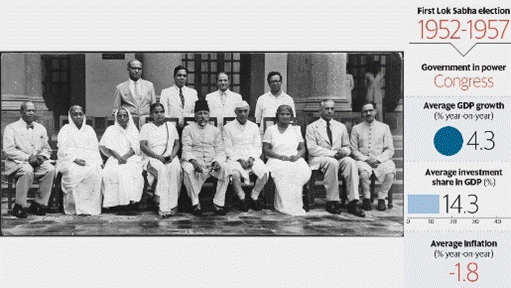
Ministry:
- Several leaders of the freedom struggle found a place in the Ministry.
- Abdul Kalam Azad became India's first minister of education, national resources, and scientific research under the Congress leadership.
- Gulzarilal Nanda held the position of India's first minister of planning and river valley schemes.
- In addition to the three original categories of officials — Cabinet Ministers, Minister of State, and Deputy Ministers — the Indian parliament introduced a fourth distinction known as Ministers of Cabinet rank.
- This addition broadened the composition of the parliamentary officials.
Speaker:
- Ganesh Vasudev Mavalankar, famously called 'Dadasaheb', served as the first Speaker of the Lok Sabha.
- In Mr. Nehru’s eyes, Dadasaheb was the ’Father of the Lok Sabha’.
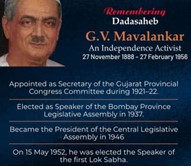
2nd Lok Sabha (1957 / 1962)
- Total seats: 505
- Winning party: Indian National Congress
- Prime Minister: Jawaharlal Nehru
- Term in office: April 5, 1957 - April 2, 1962
- Leader of the Opposition: No official Leader of the Opposition
- Speaker of the House: M.A. Ayyangar
- Term in Lok Sabha: February 27, 1956 - April 16, 1962
Overview:
- The Second Lok Sabha convened on April 5, with Jawaharlal Nehru re-elected as the leader.
- It ran for a full session until 1962.
- The session was the first conducted after the enactment of the States Reorganisation Act, 1956.
- This act reorganized the country into 13 States and four Union Territories, drawing new boundaries along regional and linguistic identities.
- Nehru's governance model helped the Congress dominate the political landscape.
Election Outcome:
- The Indian National Congress, led by Nehru, easily claimed a second term in power, securing 371 of the 494 Lok Sabha seats.
Government Focus:
- The government focused on integrating princely states, as this was the first sitting after the first Delimitation Commission Act, 1952.
- The Lok Sabha discussed national planning, workers’ education, initiated industrial projects, and designed a resilient economic system.
- Parliament passed the landmark Dowry Prohibition Act, 1961, consolidating anti-dowry laws passed in different States.
- India’s foray into scientific research and space ambitions accelerated during this period.
- Nehru’s government, with support from Vikram Sarabhai and scientist Homi Bhabha, identified an area called ‘space research and the peaceful uses of outer space’ in 1961.
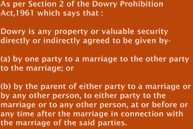
Congress Dominance:
- The ruling Congress consolidated its position in post-independent India, benefiting from the absence of a strong Opposition and Nehru’s popularity and socialist vision.
3rd Lok Sabha (1962 / 1967)
- Winning party: Indian National Congress
- Prime Minister(s):
- Jawaharlal Nehru (August 15, 1947 - May 27, 1964)
- Gulzarilal Nanda (May 27 - June 9, 1964; January 11 - January 24, 1966)
- Lal Bahadur Shastri (June 9, 1964 - January 11, 1966)
- Indira Gandhi (January 24, 1966 - March 3, 1967)
- Leader of the Opposition: No official Leader of the Opposition.
- Speaker of the House: Sardar Hukam Singh
- Term in Lok Sabha: April 17, 1962 - March 16, 1967
Overview:
- The third Lok Sabha ran from April 2, 1962, to March 3, 1967.
- Nehru was elected Prime Minister for the third time, serving the longest continuous term in Indian history of 16 years.
- Changes in leadership and the emergence of regional parties, including the Dravida Munnetra Kazhagam (DMK) in Tamil Nadu, shaped the political landscape.
- Amid a focus on economic development and conflicts with China and Pakistan, these factors influenced the trajectory of governance.
- It marked the beginning of the Congress party’s enduring internal conflict and factionalism.
- Nehru’s non-aligned stance during the Cold War informed India’s foreign policy.
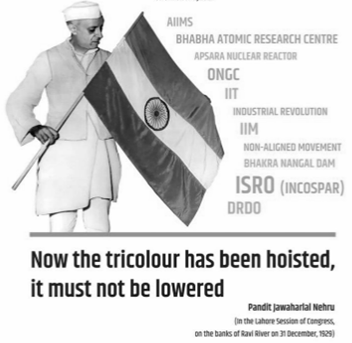
Election and Governance:
- This was the first Lok Sabha with Parliamentary Constituencies reserved for Scheduled Caste categories.
- The electoral procedure made history with polling conducted in under a week, from February 19 to February 25.
- Additionally, it marked the first instance of using indelible ink in the voting process.

Top victors:
- INC (44.72% votes), Communist Party of India (9.94%), and Swatantra Party (7.89%).
- Following Nehru's passing in 1964, five ceremonies of swearing in four prime ministers were witnessed.
- Gulzarilal Nanda served as Interim Prime Minister.
- He was succeeded by Lal Bahadur Shastri, who later died abruptly under mysterious circumstances in Tashkent, Uzbekistan.
- Indira Gandhi took over as Prime Minister on January 24, 1966.
- Sardar Hukam Singh served as the Speaker of the House.
Government Initiatives:
- Under Nehru's leadership, economic development through the Second Five Year Plan promoted rapid industrialization.
- The cabinet size was increased to 17, with the creation of a new Ministry of Steel and Heavy Industries.
- Shastri promoted the White Revolution and campaigned to increase milk production under the “Jai Jawan, Jai Kisan” slogan.
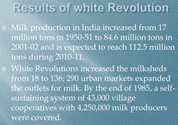
Challenges and Events:
- The Indo-China war of 1962 unfolded during this session.
- Nehru reportedly sought help from the U.S. and other Western countries for military assistance.
- Nehru adopted the non-alignment movement during the Cold War.
- Indira Gandhi's leadership saw crises including monsoon failure, controversial devaluation exercises, contentious reorganization of Punjab, and demands for banning cow slaughter.
- The Lok Sabha was stormed by a mob on November 9, 1966, one of the first instances when India’s Parliament was breached.
Aftermath:
- India held its fourth General Elections in February 1967, where Congress formed the government for the third time amidst early signs of internal dissent.
- Regional parties gained national popularity, and India continued its non-alignment stance in foreign policy.
4th Lok Sabha (1967 / 1970)
- Winning party: Indian National Congress
- Prime Minister(s): Indira Gandhi
- Term in office: March 13, 1967 - March 18, 1971
- Leader of the Opposition: Ram Subhag Singh in 1969, after the split in the Congress party
- Speaker of the House: N. Sanjiva Reddy
- Term in Lok Sabha: March 17, 1967 - July 19, 1969
Overview:
- The Indian National Congress secured 56% of the seats (283), followed by Swatantra Party (44) and Bharatiya Jana Sangh (35).
- Congress's majority reduced compared to previous years, facing strong Opposition and coalition governments.
Election and Governance:
- Congress retained power with a reduced majority, facing Opposition in several key states.
- This election marked the first woman elected as Prime Minister.
- Two contenders, Morarji Desai and Indira Gandhi, vied for the position.
- Congress faced challenges of a resentful electorate, a strong Opposition, economic distress, food insecurity, and corruption charges.
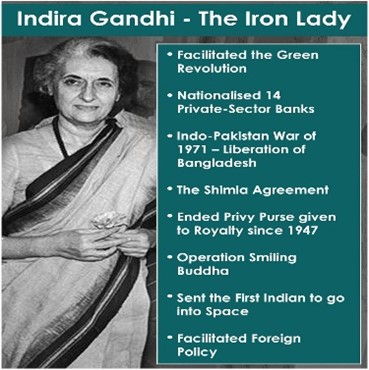
Economic Challenges:
- The Third Plan for economic growth was deemed an "unmitigated disaster", leading to food insecurity and famine-like conditions.
- Indira Gandhi proposed bank nationalization on July 10, 1969, to address economic problems, leading to friction within the party.
Internal Conflict:
- Indira Gandhi's proposal for bank nationalization led to increased friction within Congress, resulting in her expulsion in November 1969 by the party’s working committee.
- The division solidified, as Indira Gandhi established the opposing faction named the Indian National Congress (Requisitionists) group.
- Internal conflict threatened Congress’s stability, leading to Indira Gandhi's advice for Parliament dissolution.
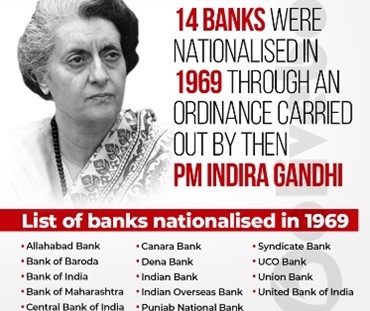
Indira Gandhi's Leadership:
- Indira Gandhi, India’s first and only female Prime Minister, enacted policies to curb economic distress.
- Her tenure saw the emergence of coalition governments amidst internal party conflict and opposition challenges.
5th Lok Sabha (1971 / 1977)
- Winning party: Indian National Congress (I)
- Prime Minister(s): Indira Gandhi
- Term in office: March 19, 1971 - March 24, 1977
- Leader of the Opposition: No initial official Leader of the Opposition due to the overwhelming majority of the ruling party.
- Raj Narain of the Bharatiya Lok Dal became the Leader of the Opposition by the mid-1970s.
- Speaker(s) of the House: G. S. Dhillon (August 8, 1969 - December 1, 1975) and Bali Ram Bhagat (January 5, 1976 - March 25, 1977)
Overview:
- Indira Gandhi-led government pivoted to socialist policies and introduced the economic goal of eradicating poverty.
- India’s support for Bangladesh liberation efforts bolstered Mrs. Gandhi’s popularity.
- The Emergency was declared, one of the darkest periods in India’s post-independent history.
Polls:
- Polling was conducted in March 1971 across 18 States and nine Union Territories representing 518 constituencies.
- 53 parties participated, with eight national parties fetching 77.84% votes.
- Voter turnout was 55.27%, with a decline in the number of voters compared to 1967.
Election Outcome:
- Congress "swept back into power" with 352 seats, gaining nearly absolute control of the government.
- Communist Party of India (Marxist) trailed with 25 seats, followed by Communist Party of India and Dravida Munnetra Kazhagam (DMK) with 23 seats each.
- Shiv Sena fielded candidates for the first time in Lok Sabha polls.
Government Policies:
- Congress's inclination towards socialism resonated amid economic strain.
- Economic reforms included moderate tax increases on higher-income people and promoting the Green Revolution.
- Gandhi extended the term of the Lok Sabha through legislation.
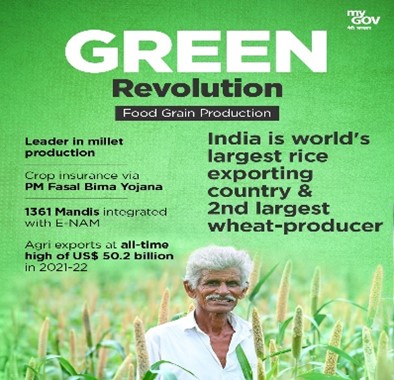
Constitutional Amendments:
- The Constitution was amended 19 times, addressing various matters such as the functioning of nationalized banks.
- Additionally, amendments were made to incorporate findings from an inquiry into the Disappearance of Netaji Subhash Chandra Bose.
- The Constitution (Twenty-Sixth) Amendment Act, 1971, eliminated privy purses, advancing the goal of forging an egalitarian society.
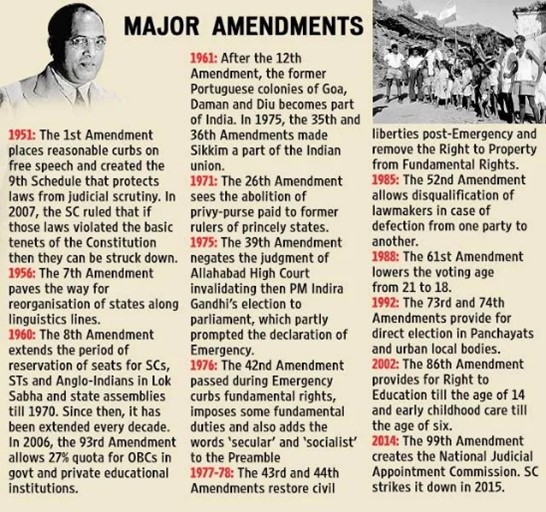
Bangladesh Liberation War:
- India demonstrated political leadership during the Bangladesh Liberation War.
- Gandhi's international travels with Defence Minister Sardar Swaran Singh built support for an independent Bangladesh.
Emergency Period:
- Allegations of political repression, restriction of the free press, and human rights violations arose.
- The Allahabad High Court found Gandhi guilty of election malpractice, leading to the declaration of Emergency on June 25, 1975.
- Concerns grew over Gandhi's authoritarian streak within the party, leading to the dissolution of the Lok Sabha in 1977.
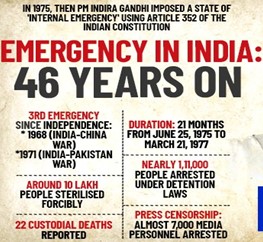
Aftermath:
- Indira Gandhi’s ‘Garibi Hatao’ slogan and role in the Bangladesh war strengthened her appeal among the masses, but concern grew over her authoritarianism.
- India saw one of its darkest periods with the declaration of Emergency and the suspension of civil liberties.
-------------------------------------
Leave a Reply
Your Comment is awaiting moderation.


